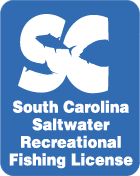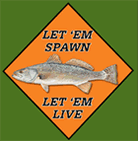| MRRI Director |
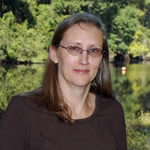 Tanya Darden is a Senior Marine Scientist and the Director of the Marine Resources Research Institute. She joined SCDNR in 2007 after completing her BS at the University of Texas at Austin, MS and PhD at the University of Southern Mississippi, and teaching at the College of Charleston. She has experience in a wide range of research areas working with both freshwater and marine fishes. Our team works collaboratively on all research projects with groups both within and external to DNR. Our research umbrella focuses on developing and implementing genetic tools for diverse applications, from traditional population genetics to assessing environmental impacts, all with the ultimate goal of improving the science available to fisheries managers. As both natural and anthropogenic pressures on recreational and commercial fisheries change, effective management of these populations will become even more important to their sustainability. Tanya Darden is a Senior Marine Scientist and the Director of the Marine Resources Research Institute. She joined SCDNR in 2007 after completing her BS at the University of Texas at Austin, MS and PhD at the University of Southern Mississippi, and teaching at the College of Charleston. She has experience in a wide range of research areas working with both freshwater and marine fishes. Our team works collaboratively on all research projects with groups both within and external to DNR. Our research umbrella focuses on developing and implementing genetic tools for diverse applications, from traditional population genetics to assessing environmental impacts, all with the ultimate goal of improving the science available to fisheries managers. As both natural and anthropogenic pressures on recreational and commercial fisheries change, effective management of these populations will become even more important to their sustainability. |
| Estuarine Finfish |
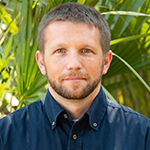 Aaron Watson is an Associate Marine Scientist and Estuarine Finfish Research (EFR) Coordinator overseeing the Mariculture, Population Genetics, and Inshore Fisheries Research groups. He received a B.S. in marine biology from the University of North Carolina at Wilmington, an M.S. in Marine Science from the University of Texas at Austin, and a Ph.D. in Marine, Estuarine, and Environmental Sciences from the University of Maryland, College Park. While the EFR groups maintain diverse research interests they all contribute to the SCDNR marine stocking research program which currently focuses on Red Drum, Cobia, and Southern Flounder and utilizing empirical studies with cultured animals to better understand population dynamics and life history of wild fish to improve management. Aaron’s other research interests focus is on developing improved feeds for aquaculture that reduce the use of fishmeal and fish oil for a variety of species in intensive culture, developing fast, cost effective methods to evaluate diet performance, and evaluating new ingredients for the inclusion in aquaculture feeds. Aaron Watson is an Associate Marine Scientist and Estuarine Finfish Research (EFR) Coordinator overseeing the Mariculture, Population Genetics, and Inshore Fisheries Research groups. He received a B.S. in marine biology from the University of North Carolina at Wilmington, an M.S. in Marine Science from the University of Texas at Austin, and a Ph.D. in Marine, Estuarine, and Environmental Sciences from the University of Maryland, College Park. While the EFR groups maintain diverse research interests they all contribute to the SCDNR marine stocking research program which currently focuses on Red Drum, Cobia, and Southern Flounder and utilizing empirical studies with cultured animals to better understand population dynamics and life history of wild fish to improve management. Aaron’s other research interests focus is on developing improved feeds for aquaculture that reduce the use of fishmeal and fish oil for a variety of species in intensive culture, developing fast, cost effective methods to evaluate diet performance, and evaluating new ingredients for the inclusion in aquaculture feeds. |
| Mariculture - Charleston, SC |
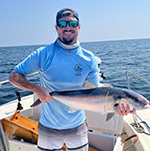 Justin Yost was born and raised in the low country and received his undergraduate degree in Biology at the College of Charleston in 2004 and immediately began his career as a biologist with the Mariculture section at DNR. Interests and work experience includes reproduction and stocking of our local estuarine fish, fisheries management and life history of cobia, tracking fish movements using acoustic and satellite telemetry, and nutrition research examining sustainable protein and lipid alternatives. Justin Yost was born and raised in the low country and received his undergraduate degree in Biology at the College of Charleston in 2004 and immediately began his career as a biologist with the Mariculture section at DNR. Interests and work experience includes reproduction and stocking of our local estuarine fish, fisheries management and life history of cobia, tracking fish movements using acoustic and satellite telemetry, and nutrition research examining sustainable protein and lipid alternatives. |
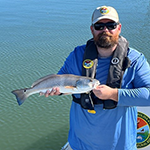 Thomas McBride (TJ) is originally from Virginia and received two Bachelor’s degrees from Coastal Carolina University and a Masters from Winthrop University. He joined the Mariculture section of SCDNR in the spring of 2023 and has taken on the role of animal husbandry and tank construction for the broodstock systems at MRRI. If you don’t find him with his head in a tank he may be out fishing or taking some photos of the local fauna or of the fantastic Charleston skyline. Thomas McBride (TJ) is originally from Virginia and received two Bachelor’s degrees from Coastal Carolina University and a Masters from Winthrop University. He joined the Mariculture section of SCDNR in the spring of 2023 and has taken on the role of animal husbandry and tank construction for the broodstock systems at MRRI. If you don’t find him with his head in a tank he may be out fishing or taking some photos of the local fauna or of the fantastic Charleston skyline. |
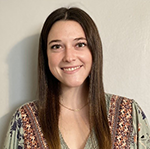 Haley Lasco earned her Bachelor of Science degree from the University of Tampa in 2019 and earned her Master’s in aquaculture at the University of Miami: Rosenstiel School in 2023. Her thesis work focused on integrated multitrophic aquaculture with finfish and macroalgae. She has a strong interest in research that advances the aquaculture field and a passion for live feeds culture. She joined the SCDNR Mariculture section in July of 2023. Her responsibilities at SCDNR include: husbandry of Cobia, Red drum, Southern Flounder, and Spotted Seatrout. Monitoring water quality, spawning, and helping with live feeds. As well as assisting on active research projects in the Mariculture section. Haley Lasco earned her Bachelor of Science degree from the University of Tampa in 2019 and earned her Master’s in aquaculture at the University of Miami: Rosenstiel School in 2023. Her thesis work focused on integrated multitrophic aquaculture with finfish and macroalgae. She has a strong interest in research that advances the aquaculture field and a passion for live feeds culture. She joined the SCDNR Mariculture section in July of 2023. Her responsibilities at SCDNR include: husbandry of Cobia, Red drum, Southern Flounder, and Spotted Seatrout. Monitoring water quality, spawning, and helping with live feeds. As well as assisting on active research projects in the Mariculture section. |
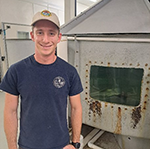 Colin Ward earned a B.S in marine science from the University of North Carolina Wilmington in 2021. He got his introduction into mariculture from a temporary position with Bears Bluff National Fish hatchery in 2022. He then joined DNR in 2023 and became a biologist that same year. His main responsibilities include husbandry of cobia, red drum, flounder, and spotted seatrout broodstock, transporting juvenile fish for release, and managing the cooperating angler fin clip program. Outside of work Colin enjoys a wide range of hobbies including, recreational sports, videogames, fishing, hunting, and camping. Colin Ward earned a B.S in marine science from the University of North Carolina Wilmington in 2021. He got his introduction into mariculture from a temporary position with Bears Bluff National Fish hatchery in 2022. He then joined DNR in 2023 and became a biologist that same year. His main responsibilities include husbandry of cobia, red drum, flounder, and spotted seatrout broodstock, transporting juvenile fish for release, and managing the cooperating angler fin clip program. Outside of work Colin enjoys a wide range of hobbies including, recreational sports, videogames, fishing, hunting, and camping. |
| Mariculture - Waddell Mariculture Center |
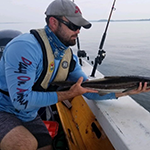 Jason Broach joined the Mariculture section in 2018 as an Assistant Marine Scientist stationed at the Waddell Mariculture Center and manages the Mariculture section. A passion for all things related to fish led him to obtain a B.S. in Biology at Erskine College in 2007, a M.S. in Fisheries and Allied Aquaculture at Auburn University in 2009, and a Ph.D. in Fisheries and Aquatic Sciences at the University of Florida in 2014. Jason has research experience with more than 20 marine and freshwater fishes and knowledge to complete the lifecycle of those and many more in captivity. He has broad research interests in applied aquaculture of fishes from spawning, larval culture, and juvenile grow-out to recirculating system design and stock enhancement. Jason Broach joined the Mariculture section in 2018 as an Assistant Marine Scientist stationed at the Waddell Mariculture Center and manages the Mariculture section. A passion for all things related to fish led him to obtain a B.S. in Biology at Erskine College in 2007, a M.S. in Fisheries and Allied Aquaculture at Auburn University in 2009, and a Ph.D. in Fisheries and Aquatic Sciences at the University of Florida in 2014. Jason has research experience with more than 20 marine and freshwater fishes and knowledge to complete the lifecycle of those and many more in captivity. He has broad research interests in applied aquaculture of fishes from spawning, larval culture, and juvenile grow-out to recirculating system design and stock enhancement. |
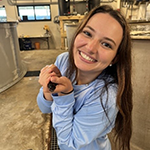 Lora Payne graduated from the University of North Georgia with a bachelors degree in Pre-Vet Biology. After taking a marine biology course her junior year of college from a previous SCDNR geneticist employee, she knew this was the career field she wanted to be in. Lora now works as a finfish biologist for the Mariculture division of the SCDNR. Her main duties involve the husbandry of cobia, red drum, triple tail, and southern flounder. Her research interests involve disease management. She is currently researching the use of ivermectin to eliminate philometrid parasites that commonly plague southern flounder. Lora Payne graduated from the University of North Georgia with a bachelors degree in Pre-Vet Biology. After taking a marine biology course her junior year of college from a previous SCDNR geneticist employee, she knew this was the career field she wanted to be in. Lora now works as a finfish biologist for the Mariculture division of the SCDNR. Her main duties involve the husbandry of cobia, red drum, triple tail, and southern flounder. Her research interests involve disease management. She is currently researching the use of ivermectin to eliminate philometrid parasites that commonly plague southern flounder. |
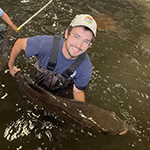 Evan Bowman received a B.S. in Biology from the University of South Carolina Beaufort and began working for the South Carolina Department of Natural resources in 2021 with the Mariculture group. He started as an intern at the Waddell Mariculture Center in Bluffton, SC and is currently a Wildlife Biologist I. His work focuses on the extensive and intensive rearing of marine finfish species including red drum, cobia, and southern flounder. He focuses heavily on the pond culture and release of these species for sustainable stock enhancement purposes. This includes everything from collecting broodstock for spawning to rearing the larvae to a releasable size. Evan Bowman received a B.S. in Biology from the University of South Carolina Beaufort and began working for the South Carolina Department of Natural resources in 2021 with the Mariculture group. He started as an intern at the Waddell Mariculture Center in Bluffton, SC and is currently a Wildlife Biologist I. His work focuses on the extensive and intensive rearing of marine finfish species including red drum, cobia, and southern flounder. He focuses heavily on the pond culture and release of these species for sustainable stock enhancement purposes. This includes everything from collecting broodstock for spawning to rearing the larvae to a releasable size. |
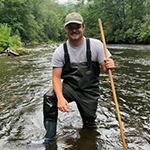 Will Crowson, Biologist I, graduated from University of South Carolina at Beaufort in 2022 with a degree in Biology and joined SCDNR later that year. Will has explored his passion for fish culture since he was a teenager, asking his father if he could repurpose an old greenhouse for building aquarium systems and breeding fish. Prior to joining the MRD Mariculture section, Will worked as an intern for our SCDNR Freshwater Division at the Cohen Campbell Hatchery. Will also serves in the Air Force Reserves and is an avid angler. Will Crowson, Biologist I, graduated from University of South Carolina at Beaufort in 2022 with a degree in Biology and joined SCDNR later that year. Will has explored his passion for fish culture since he was a teenager, asking his father if he could repurpose an old greenhouse for building aquarium systems and breeding fish. Prior to joining the MRD Mariculture section, Will worked as an intern for our SCDNR Freshwater Division at the Cohen Campbell Hatchery. Will also serves in the Air Force Reserves and is an avid angler. |
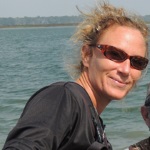 Erin Levesque received a B. S. in Marine Science from Eckerd College (1996) and a M. S. in Marine Biology from the College of Charleston (2000) where she completed a thesis on the biology of diamondback terrapins. She has been a Marine Resources Division Biologist (SCDNR) since 2000 beginning with the Inshore Fisheries Research Section and currently for the Mariculture Research Section managing the Waddell Mariculture Center. Erin Levesque received a B. S. in Marine Science from Eckerd College (1996) and a M. S. in Marine Biology from the College of Charleston (2000) where she completed a thesis on the biology of diamondback terrapins. She has been a Marine Resources Division Biologist (SCDNR) since 2000 beginning with the Inshore Fisheries Research Section and currently for the Mariculture Research Section managing the Waddell Mariculture Center. |
| Population Genetics |
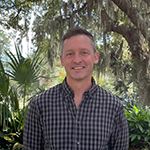 Rich Harrington is an Associate Marine Scientist with the Population Genetics Lab since 2023. He received a B.S. in Biology from University of Tennessee, M.S. in Entomology from Clemson University, and Ph.D. in Ecology and Evolutionary Biology from Yale University, studying taxonomy and population genetics of fishes. He has conducted research on a wide range of freshwater and marine fishes using genetic data to study their evolutionary history and ecology. At SCDNR, he works with the Population Genetics Lab to develop applications of genetic data that help us more effectively conserve and manage our natural resources. Rich Harrington is an Associate Marine Scientist with the Population Genetics Lab since 2023. He received a B.S. in Biology from University of Tennessee, M.S. in Entomology from Clemson University, and Ph.D. in Ecology and Evolutionary Biology from Yale University, studying taxonomy and population genetics of fishes. He has conducted research on a wide range of freshwater and marine fishes using genetic data to study their evolutionary history and ecology. At SCDNR, he works with the Population Genetics Lab to develop applications of genetic data that help us more effectively conserve and manage our natural resources. |
 Lengxob 'Lenny' Yong is an Assistant Marine Scientist with the Population Genetics team since 2022. He received a B.S. in Biology and B.A. in Psychology from Berry College, followed by a M.S. in Biology at Georgia State University and a Ph.D. in Integrative Biology at East Carolina University. Prior to joining SCDNR, Lenny completed postdoctoral work at the University of Exeter, UK. His research experience includes fish genetics and genetics of sex differences and population differentiation. At SCDNR, Lenny works on tool development and discovery of genetic markers linked with sex and species differences. Lengxob 'Lenny' Yong is an Assistant Marine Scientist with the Population Genetics team since 2022. He received a B.S. in Biology and B.A. in Psychology from Berry College, followed by a M.S. in Biology at Georgia State University and a Ph.D. in Integrative Biology at East Carolina University. Prior to joining SCDNR, Lenny completed postdoctoral work at the University of Exeter, UK. His research experience includes fish genetics and genetics of sex differences and population differentiation. At SCDNR, Lenny works on tool development and discovery of genetic markers linked with sex and species differences. |
 Matt J. Walker is a Wildlife Biologist with SCDNR’s Population Genetics Team since the summer of 2008. Matt received a B.S. and a M.S. in biology from East Carolina University. Matt’s undergraduate and graduate research focus was on millipede systematics. At SCDNR, Matt’s research spans a wide range of projects including general fish population genetics, stock enhancement research to genetic tool development. Matt J. Walker is a Wildlife Biologist with SCDNR’s Population Genetics Team since the summer of 2008. Matt received a B.S. and a M.S. in biology from East Carolina University. Matt’s undergraduate and graduate research focus was on millipede systematics. At SCDNR, Matt’s research spans a wide range of projects including general fish population genetics, stock enhancement research to genetic tool development. |
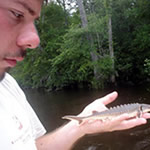 Daniel Farrae is a Wildlife biologist with SCDNR’s Population Genetics team since February 2010. Daniel earned a B.S. at Loyola University New Orleans. He then worked for a year as the laboratory manager at the Nekton Research Laboratory at the University of New Orleans, spending much of his time sampling fish and invertebrates throughout southeast Louisiana habitats. Daniel earned his M.S. in fish biology from the University of Georgia in 2010 and wrote his thesis on the population dynamics and habitat use of shortnose sturgeon. At SCDNR, Daniel primarily focuses on freshwater and diadromous fishes. Daniel Farrae is a Wildlife biologist with SCDNR’s Population Genetics team since February 2010. Daniel earned a B.S. at Loyola University New Orleans. He then worked for a year as the laboratory manager at the Nekton Research Laboratory at the University of New Orleans, spending much of his time sampling fish and invertebrates throughout southeast Louisiana habitats. Daniel earned his M.S. in fish biology from the University of Georgia in 2010 and wrote his thesis on the population dynamics and habitat use of shortnose sturgeon. At SCDNR, Daniel primarily focuses on freshwater and diadromous fishes. |
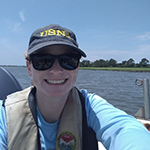 Jackie Allen received a B.A. in Biology from Goucher College in 2008 and a M.S. in Marine Biology from the College of Charleston in 2014. Her master’s thesis focused on the genetic population structure of black drum in the US (under her maiden name, Leidig). She began working as a biologist in the population genetics lab in the fall of 2018 where she has focused on projects with cobia, spotted seatrout, and southern flounder. Jackie Allen received a B.A. in Biology from Goucher College in 2008 and a M.S. in Marine Biology from the College of Charleston in 2014. Her master’s thesis focused on the genetic population structure of black drum in the US (under her maiden name, Leidig). She began working as a biologist in the population genetics lab in the fall of 2018 where she has focused on projects with cobia, spotted seatrout, and southern flounder. |
 Ellen Reiber received a B.S. in Marine Biology from Auburn University and a M.S. in Marine Biology from College of Charleston. Her master’s thesis work was with the SCDNR population genetics lab, focusing on population genetics and parentage of white seabass in southern California. After graduating from College of Charleston, Ellen was hired as a Wildlife Biologist in the population genetics lab in 2022. She has since continued her work on white seabass and other species, including striped bass and shortnose sturgeon. Ellen Reiber received a B.S. in Marine Biology from Auburn University and a M.S. in Marine Biology from College of Charleston. Her master’s thesis work was with the SCDNR population genetics lab, focusing on population genetics and parentage of white seabass in southern California. After graduating from College of Charleston, Ellen was hired as a Wildlife Biologist in the population genetics lab in 2022. She has since continued her work on white seabass and other species, including striped bass and shortnose sturgeon. |
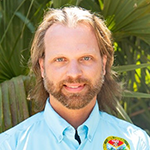 Cameron Doll is a Wildlife Biologist with Population Genetics Team since 2018. He received a B.S. in Biology (Ecology) from Penn State University and a M.S. from the College of Charleston’s Marine Biology Program. After graduating from CofC, Cameron started working at SCDNR studying links between harmful algal blooms and stormwater retention ponds, as well as, running nutrient chemistry analysis on water samples from across the state. Since coming to the Population Genetics team, Cameron has been working on the genetics of Red Drum, Striped Bass and various other species for parentage and stock contribution. He is also involved in projects sequencing intertidal invertebrates, shorebird diet metabarcoding, and crayfish population structure. Cameron Doll is a Wildlife Biologist with Population Genetics Team since 2018. He received a B.S. in Biology (Ecology) from Penn State University and a M.S. from the College of Charleston’s Marine Biology Program. After graduating from CofC, Cameron started working at SCDNR studying links between harmful algal blooms and stormwater retention ponds, as well as, running nutrient chemistry analysis on water samples from across the state. Since coming to the Population Genetics team, Cameron has been working on the genetics of Red Drum, Striped Bass and various other species for parentage and stock contribution. He is also involved in projects sequencing intertidal invertebrates, shorebird diet metabarcoding, and crayfish population structure. |
 Tanya Darden is a Senior Marine Scientist and the Director of the Marine Resources Research Institute. She joined SCDNR in 2007 after completing her BS at the University of Texas at Austin, MS and PhD at the University of Southern Mississippi, and teaching at the College of Charleston. She has experience in a wide range of research areas working with both freshwater and marine fishes. Our team works collaboratively on all research projects with groups both within and external to DNR. Our research umbrella focuses on developing and implementing genetic tools for diverse applications, from traditional population genetics to assessing environmental impacts, all with the ultimate goal of improving the science available to fisheries managers. As both natural and anthropogenic pressures on recreational and commercial fisheries change, effective management of these populations will become even more important to their sustainability.
Tanya Darden is a Senior Marine Scientist and the Director of the Marine Resources Research Institute. She joined SCDNR in 2007 after completing her BS at the University of Texas at Austin, MS and PhD at the University of Southern Mississippi, and teaching at the College of Charleston. She has experience in a wide range of research areas working with both freshwater and marine fishes. Our team works collaboratively on all research projects with groups both within and external to DNR. Our research umbrella focuses on developing and implementing genetic tools for diverse applications, from traditional population genetics to assessing environmental impacts, all with the ultimate goal of improving the science available to fisheries managers. As both natural and anthropogenic pressures on recreational and commercial fisheries change, effective management of these populations will become even more important to their sustainability. Aaron Watson is an Associate Marine Scientist and Estuarine Finfish Research (EFR) Coordinator overseeing the Mariculture, Population Genetics, and Inshore Fisheries Research groups. He received a B.S. in marine biology from the University of North Carolina at Wilmington, an M.S. in Marine Science from the University of Texas at Austin, and a Ph.D. in Marine, Estuarine, and Environmental Sciences from the University of Maryland, College Park. While the EFR groups maintain diverse research interests they all contribute to the SCDNR marine stocking research program which currently focuses on Red Drum, Cobia, and Southern Flounder and utilizing empirical studies with cultured animals to better understand population dynamics and life history of wild fish to improve management. Aaron’s other research interests focus is on developing improved feeds for aquaculture that reduce the use of fishmeal and fish oil for a variety of species in intensive culture, developing fast, cost effective methods to evaluate diet performance, and evaluating new ingredients for the inclusion in aquaculture feeds.
Aaron Watson is an Associate Marine Scientist and Estuarine Finfish Research (EFR) Coordinator overseeing the Mariculture, Population Genetics, and Inshore Fisheries Research groups. He received a B.S. in marine biology from the University of North Carolina at Wilmington, an M.S. in Marine Science from the University of Texas at Austin, and a Ph.D. in Marine, Estuarine, and Environmental Sciences from the University of Maryland, College Park. While the EFR groups maintain diverse research interests they all contribute to the SCDNR marine stocking research program which currently focuses on Red Drum, Cobia, and Southern Flounder and utilizing empirical studies with cultured animals to better understand population dynamics and life history of wild fish to improve management. Aaron’s other research interests focus is on developing improved feeds for aquaculture that reduce the use of fishmeal and fish oil for a variety of species in intensive culture, developing fast, cost effective methods to evaluate diet performance, and evaluating new ingredients for the inclusion in aquaculture feeds. Justin Yost was born and raised in the low country and received his undergraduate degree in Biology at the College of Charleston in 2004 and immediately began his career as a biologist with the Mariculture section at DNR. Interests and work experience includes reproduction and stocking of our local estuarine fish, fisheries management and life history of cobia, tracking fish movements using acoustic and satellite telemetry, and nutrition research examining sustainable protein and lipid alternatives.
Justin Yost was born and raised in the low country and received his undergraduate degree in Biology at the College of Charleston in 2004 and immediately began his career as a biologist with the Mariculture section at DNR. Interests and work experience includes reproduction and stocking of our local estuarine fish, fisheries management and life history of cobia, tracking fish movements using acoustic and satellite telemetry, and nutrition research examining sustainable protein and lipid alternatives. Thomas McBride (TJ) is originally from Virginia and received two Bachelor’s degrees from Coastal Carolina University and a Masters from Winthrop University. He joined the Mariculture section of SCDNR in the spring of 2023 and has taken on the role of animal husbandry and tank construction for the broodstock systems at MRRI. If you don’t find him with his head in a tank he may be out fishing or taking some photos of the local fauna or of the fantastic Charleston skyline.
Thomas McBride (TJ) is originally from Virginia and received two Bachelor’s degrees from Coastal Carolina University and a Masters from Winthrop University. He joined the Mariculture section of SCDNR in the spring of 2023 and has taken on the role of animal husbandry and tank construction for the broodstock systems at MRRI. If you don’t find him with his head in a tank he may be out fishing or taking some photos of the local fauna or of the fantastic Charleston skyline. Haley Lasco earned her Bachelor of Science degree from the University of Tampa in 2019 and earned her Master’s in aquaculture at the University of Miami: Rosenstiel School in 2023. Her thesis work focused on integrated multitrophic aquaculture with finfish and macroalgae. She has a strong interest in research that advances the aquaculture field and a passion for live feeds culture. She joined the SCDNR Mariculture section in July of 2023. Her responsibilities at SCDNR include: husbandry of Cobia, Red drum, Southern Flounder, and Spotted Seatrout. Monitoring water quality, spawning, and helping with live feeds. As well as assisting on active research projects in the Mariculture section.
Haley Lasco earned her Bachelor of Science degree from the University of Tampa in 2019 and earned her Master’s in aquaculture at the University of Miami: Rosenstiel School in 2023. Her thesis work focused on integrated multitrophic aquaculture with finfish and macroalgae. She has a strong interest in research that advances the aquaculture field and a passion for live feeds culture. She joined the SCDNR Mariculture section in July of 2023. Her responsibilities at SCDNR include: husbandry of Cobia, Red drum, Southern Flounder, and Spotted Seatrout. Monitoring water quality, spawning, and helping with live feeds. As well as assisting on active research projects in the Mariculture section. Colin Ward earned a B.S in marine science from the University of North Carolina Wilmington in 2021. He got his introduction into mariculture from a temporary position with Bears Bluff National Fish hatchery in 2022. He then joined DNR in 2023 and became a biologist that same year. His main responsibilities include husbandry of cobia, red drum, flounder, and spotted seatrout broodstock, transporting juvenile fish for release, and managing the cooperating angler fin clip program. Outside of work Colin enjoys a wide range of hobbies including, recreational sports, videogames, fishing, hunting, and camping.
Colin Ward earned a B.S in marine science from the University of North Carolina Wilmington in 2021. He got his introduction into mariculture from a temporary position with Bears Bluff National Fish hatchery in 2022. He then joined DNR in 2023 and became a biologist that same year. His main responsibilities include husbandry of cobia, red drum, flounder, and spotted seatrout broodstock, transporting juvenile fish for release, and managing the cooperating angler fin clip program. Outside of work Colin enjoys a wide range of hobbies including, recreational sports, videogames, fishing, hunting, and camping. Jason Broach joined the Mariculture section in 2018 as an Assistant Marine Scientist stationed at the Waddell Mariculture Center and manages the Mariculture section. A passion for all things related to fish led him to obtain a B.S. in Biology at Erskine College in 2007, a M.S. in Fisheries and Allied Aquaculture at Auburn University in 2009, and a Ph.D. in Fisheries and Aquatic Sciences at the University of Florida in 2014. Jason has research experience with more than 20 marine and freshwater fishes and knowledge to complete the lifecycle of those and many more in captivity. He has broad research interests in applied aquaculture of fishes from spawning, larval culture, and juvenile grow-out to recirculating system design and stock enhancement.
Jason Broach joined the Mariculture section in 2018 as an Assistant Marine Scientist stationed at the Waddell Mariculture Center and manages the Mariculture section. A passion for all things related to fish led him to obtain a B.S. in Biology at Erskine College in 2007, a M.S. in Fisheries and Allied Aquaculture at Auburn University in 2009, and a Ph.D. in Fisheries and Aquatic Sciences at the University of Florida in 2014. Jason has research experience with more than 20 marine and freshwater fishes and knowledge to complete the lifecycle of those and many more in captivity. He has broad research interests in applied aquaculture of fishes from spawning, larval culture, and juvenile grow-out to recirculating system design and stock enhancement. Lora Payne graduated from the University of North Georgia with a bachelors degree in Pre-Vet Biology. After taking a marine biology course her junior year of college from a previous SCDNR geneticist employee, she knew this was the career field she wanted to be in. Lora now works as a finfish biologist for the Mariculture division of the SCDNR. Her main duties involve the husbandry of cobia, red drum, triple tail, and southern flounder. Her research interests involve disease management. She is currently researching the use of ivermectin to eliminate philometrid parasites that commonly plague southern flounder.
Lora Payne graduated from the University of North Georgia with a bachelors degree in Pre-Vet Biology. After taking a marine biology course her junior year of college from a previous SCDNR geneticist employee, she knew this was the career field she wanted to be in. Lora now works as a finfish biologist for the Mariculture division of the SCDNR. Her main duties involve the husbandry of cobia, red drum, triple tail, and southern flounder. Her research interests involve disease management. She is currently researching the use of ivermectin to eliminate philometrid parasites that commonly plague southern flounder. Evan Bowman received a B.S. in Biology from the University of South Carolina Beaufort and began working for the South Carolina Department of Natural resources in 2021 with the Mariculture group. He started as an intern at the Waddell Mariculture Center in Bluffton, SC and is currently a Wildlife Biologist I. His work focuses on the extensive and intensive rearing of marine finfish species including red drum, cobia, and southern flounder. He focuses heavily on the pond culture and release of these species for sustainable stock enhancement purposes. This includes everything from collecting broodstock for spawning to rearing the larvae to a releasable size.
Evan Bowman received a B.S. in Biology from the University of South Carolina Beaufort and began working for the South Carolina Department of Natural resources in 2021 with the Mariculture group. He started as an intern at the Waddell Mariculture Center in Bluffton, SC and is currently a Wildlife Biologist I. His work focuses on the extensive and intensive rearing of marine finfish species including red drum, cobia, and southern flounder. He focuses heavily on the pond culture and release of these species for sustainable stock enhancement purposes. This includes everything from collecting broodstock for spawning to rearing the larvae to a releasable size. Will Crowson, Biologist I, graduated from University of South Carolina at Beaufort in 2022 with a degree in Biology and joined SCDNR later that year. Will has explored his passion for fish culture since he was a teenager, asking his father if he could repurpose an old greenhouse for building aquarium systems and breeding fish. Prior to joining the MRD Mariculture section, Will worked as an intern for our SCDNR Freshwater Division at the Cohen Campbell Hatchery. Will also serves in the Air Force Reserves and is an avid angler.
Will Crowson, Biologist I, graduated from University of South Carolina at Beaufort in 2022 with a degree in Biology and joined SCDNR later that year. Will has explored his passion for fish culture since he was a teenager, asking his father if he could repurpose an old greenhouse for building aquarium systems and breeding fish. Prior to joining the MRD Mariculture section, Will worked as an intern for our SCDNR Freshwater Division at the Cohen Campbell Hatchery. Will also serves in the Air Force Reserves and is an avid angler.  Erin Levesque received a B. S. in Marine Science from Eckerd College (1996) and a M. S. in Marine Biology from the College of Charleston (2000) where she completed a thesis on the biology of diamondback terrapins. She has been a Marine Resources Division Biologist (SCDNR) since 2000 beginning with the Inshore Fisheries Research Section and currently for the Mariculture Research Section managing the Waddell Mariculture Center.
Erin Levesque received a B. S. in Marine Science from Eckerd College (1996) and a M. S. in Marine Biology from the College of Charleston (2000) where she completed a thesis on the biology of diamondback terrapins. She has been a Marine Resources Division Biologist (SCDNR) since 2000 beginning with the Inshore Fisheries Research Section and currently for the Mariculture Research Section managing the Waddell Mariculture Center. Rich Harrington is an Associate Marine Scientist with the Population Genetics Lab since 2023. He received a B.S. in Biology from University of Tennessee, M.S. in Entomology from Clemson University, and Ph.D. in Ecology and Evolutionary Biology from Yale University, studying taxonomy and population genetics of fishes. He has conducted research on a wide range of freshwater and marine fishes using genetic data to study their evolutionary history and ecology. At SCDNR, he works with the Population Genetics Lab to develop applications of genetic data that help us more effectively conserve and manage our natural resources.
Rich Harrington is an Associate Marine Scientist with the Population Genetics Lab since 2023. He received a B.S. in Biology from University of Tennessee, M.S. in Entomology from Clemson University, and Ph.D. in Ecology and Evolutionary Biology from Yale University, studying taxonomy and population genetics of fishes. He has conducted research on a wide range of freshwater and marine fishes using genetic data to study their evolutionary history and ecology. At SCDNR, he works with the Population Genetics Lab to develop applications of genetic data that help us more effectively conserve and manage our natural resources. Lengxob 'Lenny' Yong is an Assistant Marine Scientist with the Population Genetics team since 2022. He received a B.S. in Biology and B.A. in Psychology from Berry College, followed by a M.S. in Biology at Georgia State University and a Ph.D. in Integrative Biology at East Carolina University. Prior to joining SCDNR, Lenny completed postdoctoral work at the University of Exeter, UK. His research experience includes fish genetics and genetics of sex differences and population differentiation. At SCDNR, Lenny works on tool development and discovery of genetic markers linked with sex and species differences.
Lengxob 'Lenny' Yong is an Assistant Marine Scientist with the Population Genetics team since 2022. He received a B.S. in Biology and B.A. in Psychology from Berry College, followed by a M.S. in Biology at Georgia State University and a Ph.D. in Integrative Biology at East Carolina University. Prior to joining SCDNR, Lenny completed postdoctoral work at the University of Exeter, UK. His research experience includes fish genetics and genetics of sex differences and population differentiation. At SCDNR, Lenny works on tool development and discovery of genetic markers linked with sex and species differences. Matt J. Walker is a Wildlife Biologist with SCDNR’s Population Genetics Team since the summer of 2008. Matt received a B.S. and a M.S. in biology from East Carolina University. Matt’s undergraduate and graduate research focus was on millipede systematics. At SCDNR, Matt’s research spans a wide range of projects including general fish population genetics, stock enhancement research to genetic tool development.
Matt J. Walker is a Wildlife Biologist with SCDNR’s Population Genetics Team since the summer of 2008. Matt received a B.S. and a M.S. in biology from East Carolina University. Matt’s undergraduate and graduate research focus was on millipede systematics. At SCDNR, Matt’s research spans a wide range of projects including general fish population genetics, stock enhancement research to genetic tool development. Daniel Farrae is a Wildlife biologist with SCDNR’s Population Genetics team since February 2010. Daniel earned a B.S. at Loyola University New Orleans. He then worked for a year as the laboratory manager at the Nekton Research Laboratory at the University of New Orleans, spending much of his time sampling fish and invertebrates throughout southeast Louisiana habitats. Daniel earned his M.S. in fish biology from the University of Georgia in 2010 and wrote his thesis on the population dynamics and habitat use of shortnose sturgeon. At SCDNR, Daniel primarily focuses on freshwater and diadromous fishes.
Daniel Farrae is a Wildlife biologist with SCDNR’s Population Genetics team since February 2010. Daniel earned a B.S. at Loyola University New Orleans. He then worked for a year as the laboratory manager at the Nekton Research Laboratory at the University of New Orleans, spending much of his time sampling fish and invertebrates throughout southeast Louisiana habitats. Daniel earned his M.S. in fish biology from the University of Georgia in 2010 and wrote his thesis on the population dynamics and habitat use of shortnose sturgeon. At SCDNR, Daniel primarily focuses on freshwater and diadromous fishes. Jackie Allen received a B.A. in Biology from Goucher College in 2008 and a M.S. in Marine Biology from the College of Charleston in 2014. Her master’s thesis focused on the genetic population structure of black drum in the US (under her maiden name, Leidig). She began working as a biologist in the population genetics lab in the fall of 2018 where she has focused on projects with cobia, spotted seatrout, and southern flounder.
Jackie Allen received a B.A. in Biology from Goucher College in 2008 and a M.S. in Marine Biology from the College of Charleston in 2014. Her master’s thesis focused on the genetic population structure of black drum in the US (under her maiden name, Leidig). She began working as a biologist in the population genetics lab in the fall of 2018 where she has focused on projects with cobia, spotted seatrout, and southern flounder. Ellen Reiber received a B.S. in Marine Biology from Auburn University and a M.S. in Marine Biology from College of Charleston. Her master’s thesis work was with the SCDNR population genetics lab, focusing on population genetics and parentage of white seabass in southern California. After graduating from College of Charleston, Ellen was hired as a Wildlife Biologist in the population genetics lab in 2022. She has since continued her work on white seabass and other species, including striped bass and shortnose sturgeon.
Ellen Reiber received a B.S. in Marine Biology from Auburn University and a M.S. in Marine Biology from College of Charleston. Her master’s thesis work was with the SCDNR population genetics lab, focusing on population genetics and parentage of white seabass in southern California. After graduating from College of Charleston, Ellen was hired as a Wildlife Biologist in the population genetics lab in 2022. She has since continued her work on white seabass and other species, including striped bass and shortnose sturgeon. Cameron Doll is a Wildlife Biologist with Population Genetics Team since 2018. He received a B.S. in Biology (Ecology) from Penn State University and a M.S. from the College of Charleston’s Marine Biology Program. After graduating from CofC, Cameron started working at SCDNR studying links between harmful algal blooms and stormwater retention ponds, as well as, running nutrient chemistry analysis on water samples from across the state. Since coming to the Population Genetics team, Cameron has been working on the genetics of Red Drum, Striped Bass and various other species for parentage and stock contribution. He is also involved in projects sequencing intertidal invertebrates, shorebird diet metabarcoding, and crayfish population structure.
Cameron Doll is a Wildlife Biologist with Population Genetics Team since 2018. He received a B.S. in Biology (Ecology) from Penn State University and a M.S. from the College of Charleston’s Marine Biology Program. After graduating from CofC, Cameron started working at SCDNR studying links between harmful algal blooms and stormwater retention ponds, as well as, running nutrient chemistry analysis on water samples from across the state. Since coming to the Population Genetics team, Cameron has been working on the genetics of Red Drum, Striped Bass and various other species for parentage and stock contribution. He is also involved in projects sequencing intertidal invertebrates, shorebird diet metabarcoding, and crayfish population structure.
